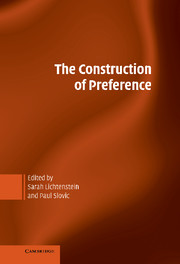Book contents
- Frontmatter
- Contents
- Contributors
- Preface
- Acknowledgments
- I INTRODUCTION
- II PREFERENCE REVERSALS
- III PSYCHOLOGICAL THEORIES OF PREFERENCE REVERSALS
- 6 Contingent Weighting in Judgment and Choice
- 7 Cognitive Processes in Preference Reversals
- 8 The Causes of Preference Reversal
- 9 Preference Reversals Between Joint and Separate Evaluations of Options: A Review And Theoretical Analysis
- 10 Attribute-Task Compatibility as a Determinant of Consumer Preference Reversals
- 11 Preferences Constructed From Dynamic Microprocessing Mechanisms
- IV EVIDENCE FOR PREFERENCE CONSTRUCTION
- V THEORIES OF PREFERENCE CONSTRUCTION
- VI AFFECT AND REASON
- VII MISWANTING
- VIII CONTINGENT VALUATION
- IX PREFERENCE MANAGEMENT
- References
- Index
9 - Preference Reversals Between Joint and Separate Evaluations of Options: A Review And Theoretical Analysis
Published online by Cambridge University Press: 05 June 2012
- Frontmatter
- Contents
- Contributors
- Preface
- Acknowledgments
- I INTRODUCTION
- II PREFERENCE REVERSALS
- III PSYCHOLOGICAL THEORIES OF PREFERENCE REVERSALS
- 6 Contingent Weighting in Judgment and Choice
- 7 Cognitive Processes in Preference Reversals
- 8 The Causes of Preference Reversal
- 9 Preference Reversals Between Joint and Separate Evaluations of Options: A Review And Theoretical Analysis
- 10 Attribute-Task Compatibility as a Determinant of Consumer Preference Reversals
- 11 Preferences Constructed From Dynamic Microprocessing Mechanisms
- IV EVIDENCE FOR PREFERENCE CONSTRUCTION
- V THEORIES OF PREFERENCE CONSTRUCTION
- VI AFFECT AND REASON
- VII MISWANTING
- VIII CONTINGENT VALUATION
- IX PREFERENCE MANAGEMENT
- References
- Index
Summary
In normative accounts of decision making, all decisions are viewed as choices between alternatives. Even when decision makers appear to be evaluating single options, such as whether to buy a particular car or to go to a certain movie, they are seen as making implicit tradeoffs. The potential car owner must trade off the benefits of car ownership against the best alternative uses of the money. The potential moviegoer is not just deciding whether to go to a movie but also between going to a movie and the next best use of her time, such as staying home and watching television.
At a descriptive level, however, there is an important distinction between situations in which multiple options are presented simultaneously and can be easily compared and situations in which alternatives are presented one at a time and evaluated in isolation. We refer to the former as the joint evaluation (JE) mode and to the latter as the separate evaluation (SE) mode. We review results from a large number of studies that document systematic changes in preferences between alternatives when those alternatives are evaluated jointly or separately. We show that these JE/SE reversals can be explained by a simple theoretical account, which we refer to as the evaluability hypothesis.
JE/SE reversals have important ramifications for decision making in real life. Arguably, all judgments and decisions are made in JE mode, in SE mode, or in some combination of the two.
Information
- Type
- Chapter
- Information
- The Construction of Preference , pp. 163 - 191Publisher: Cambridge University PressPrint publication year: 2006
